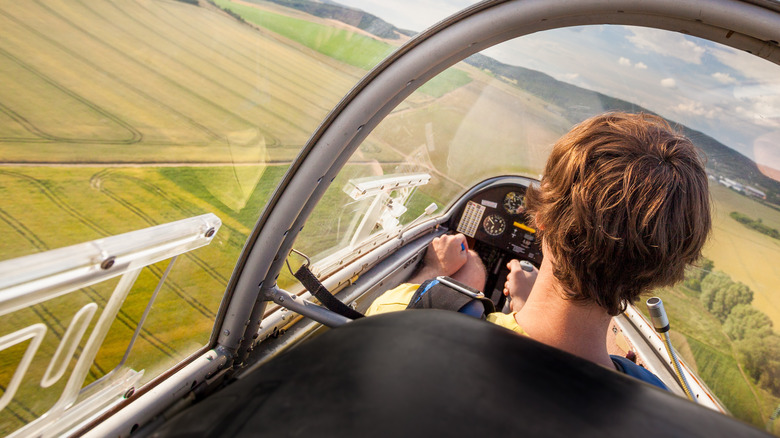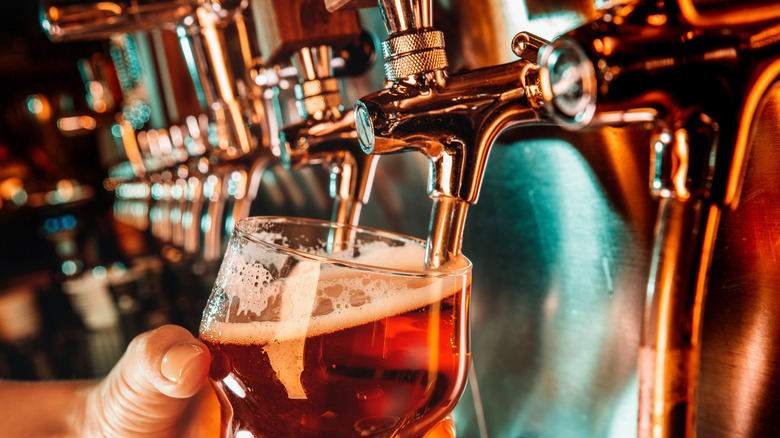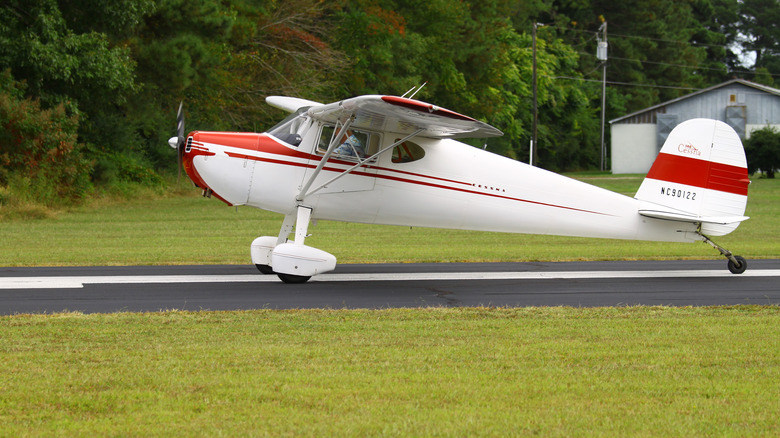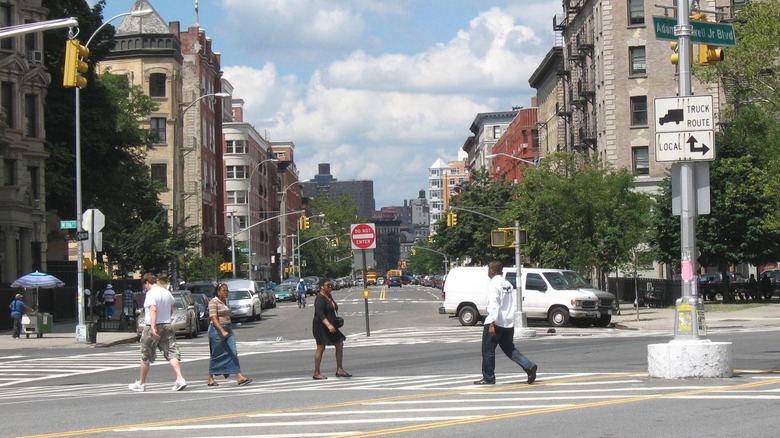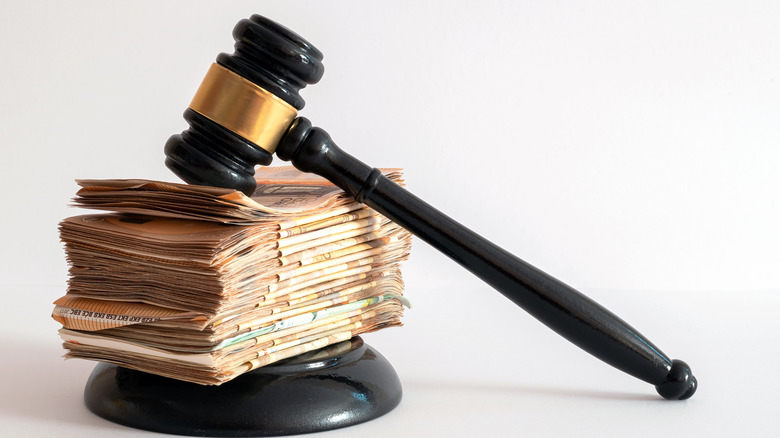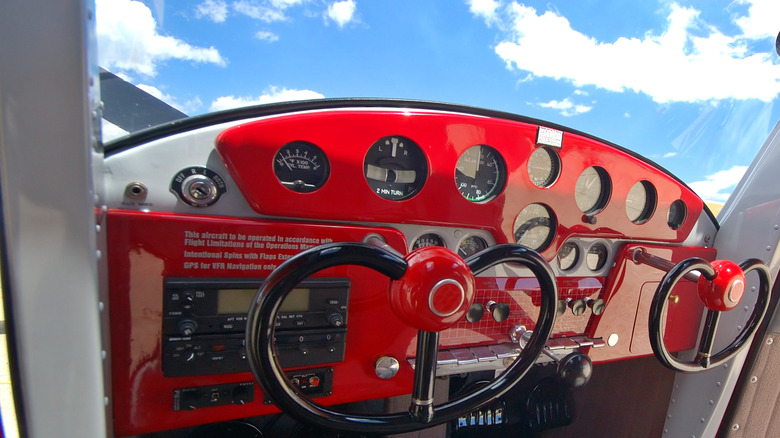The Bizarre Story Of A Bar Bet That Led To Two Stolen Planes And A Jail Sentence
The Guinness Book of World Records was started as a way to stop arguments that frequently took place in bars. For example, if you find yourself in a bar arguing over who holds the Guinness World Record for the heaviest male twins, someone can reach for the latest edition of the Guinness Book of World Records and end the argument by confirming that the answer is Billy Leon and Benny Loyd McCrary.
However, the Guinness Book of World Records can't solve every bar disagreement, and that's precisely what led to a Marine veteran landing a plane on a busy New York City street: Someone in a bar bet him he couldn't do it.
It first happened — yes, he did it twice — in 1956 when 26-year-old Thomas "Fitz" Fitzpatrick landed a plane on St. Nicholas Avenue near 191st Street in Manhattan, New York City, according to The New York Times. What makes the feat even more shocking is that Fitzpatrick had been drinking before his attempt, and he did it in a stolen plane.
Tommy Fitz makes a bar bet
According to The New York Times, the story goes that Thomas Fitzpatrick, who often went by Tommy Fitz, was out drinking in Washington Heights, New York City, in the early morning hours of September 30, 1956. Fitzpatrick was from Washington Heights, but at that time he was living across the Hudson River in New Jersey.
"Tommy had a crazy side. The whole group of them, my brother's friends, were a wild bunch." Fred Hartling, whose older brother was friends with Fitzpatrick, told The New York Times.
According to his 2009 obituary, Fitzpatrick had served in the Marine Corps in the Pacific theater during World War II and during the Korean War, where he received the Purple Heart. That night in Washington Heights, as some fellow patrons were no doubt staggering for the exits, Fitzpatrick made a claim: that he could go home to New Jersey and return to Washington Heights in under 15 minutes. Perhaps, someone else in the bar argued that it was impossible because later that night, Tommy Fitz showed them that it wasn't.
Tommy Fitz takes off on his first daring flight
Thomas Fitzgerald left the bar and headed back to New Jersey, and undertook the first in a series of illegal activities that night. To win his bet he needed a plane, and luckily for Fitz, Teterboro School of Aeronautics was nearby (via The New York Times). There he stole a single-engine, two-seater Cessna 140 aircraft and took to the skies without lights or any radio messages, according to Hangar Flights. The Cessna 140 is a small light-weight aircraft known for its stability, but at the cost of a decrease in maneuverability — something that makes what Fitzpatrick did all the more unbelievable (per Aviator Insider).
According to the Pittsburg Post Gazette, the reportedly drunk Fitzpatrick took off from Teterboro with his sights on St. Nicholas Ave. but had originally wanted to touchdown in a field at the nearby George Washington High School, according to The New York Times.
Tommy Fitz sticks the landing
As Thomas Fitzpatrick approached his planned landing spot, he ran into a slight problem, according to The New York Times. Fortunately, Fitzpatrick was lucid enough to realize that landing on the field at George Washington High School — which wasn't lit up at night — was too dangerous even for someone as gutsy as he was. So, he had to call a mid-air audible and land somewhere with lights: He opted for St. Nicholas Avenue near 191st Street, which is a street that's narrow for cars let alone airplanes.
Sam Garcia, who was just a kid at the time, saw the plane parked in the middle of the Manhattan street and thought it had to have been a joke. "I thought maybe they had trucked it in, as a practical joke, because there was no way a man had landed in that narrow street," he told The New York Times.
Thomas Fitzpatrick received little punishment for his daring flight
While there was practically nothing legal about Thomas Fitzpatrick's stunt, it impressed just about everyone. The New York Times called it "a feat of aeronautics."
Even the man who owned the Cessna 140 that Fitzpatrick had unlawfully commandeered was impressed. Fitzpatrick was initially charged with grand larceny but those charges were quickly dropped when the plane's owner chose not to sign a criminal complaint against him. However, he still wound up facing a $100 fine — which would be a little over $1,000 today — for violating a part of the city's administrative code that no one probably thought they'd ever need to enforce: the part that bans planes from landing on city streets. Still, given what he did, Tommy Fitz paid peanuts.
"If it happened today, they would call him a terrorist, and locked him up and thrown away the key," Sam Garcia, now 68, told The New York Times.
Maybe the lack of any real punishment is why he jumped at the chance to give the whole thing another go just two years later.
Tommy Fitz flies again
According to All That's Interesting, on October 5, 1958, just over two years after landing on a New York City street for the first time, Thomas Fitzpatrick was once again in a bar. This time he found himself talking to a man from Connecticut who didn't believe his story about the landing he had pulled off in 1956. So, what better way to confirm the story and make the guy from Connecticut look like a fool than by doing virtually the same thing.
Tommy Fitz once again helped himself to a plane from Teterboro School of Aeronautics but this time landed at Amsterdam and 187th Street several blocks away from his first make-shift runway. This time he fled the scene of his crime but later turned himself in, according to The New York Times.
Fitzpatrick told police at the time, that his pilot's license after his first landing on a city street, and hadn't tried to get it back because he "did not want to fly again."
This time a judge didn't find his exploits quite as amusing. Fitzpatrick was sentenced to six months in jail, and the judge noted that if Fitzpatrick had been punished more severely the first time around, then maybe he wouldn't have done it again. "Had you been properly jolted then, it's possible this would not have occurred a second time," the judge said (per The New York Times).
